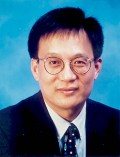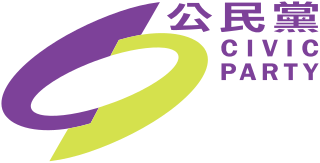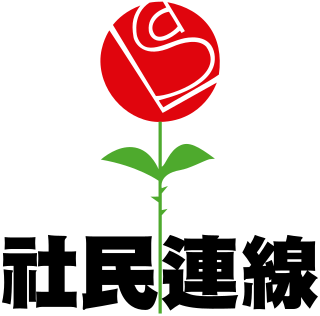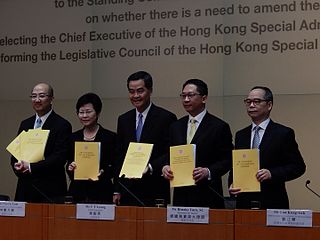
The politics of Hong Kong takes place in a framework of a political system dominated by its quasi-constitutional document, the Hong Kong Basic Law, its own legislature, the Chief Executive as the head of government and of the Special Administrative Region and of a politically constrained multi-party presidential system. The Government of the Hong Kong Special Administrative Region of the People's Republic of China is led by the Chief Executive, the head of government.

The Legislative Council of the Hong Kong Special Administrative Region, colloquially known as LegCo, is the unicameral legislature of Hong Kong. It sits under China's "one country, two systems" constitutional arrangement, and is the power centre of Hong Kong's hybrid representative democracy, though popular representation in the legislature has diminished significantly in recent years, along with its political diversity.

The Democratic Party (DP) is a liberal political party in Hong Kong. Chaired by Lo Kin-hei, it is the flagship party in the pro-democracy camp and currently has no elected representatives in the District Councils.

The 2004 Hong Kong Legislative Council election was held on 12 September 2004 for members of the Legislative Council of Hong Kong (LegCo). The election returned 30 members from directly elected geographical constituencies and 30 members from functional constituencies, of which 11 were unopposed.

The pro-democracy camp, also known as the pan-democracy camp, is a political alignment in Hong Kong that supports increased democracy, namely the universal suffrage of the Chief Executive and the Legislative Council as given by the Basic Law under the "One Country, Two Systems" framework.

The Civic Party (CP) was a pro-democracy liberal political party from March 2006 to May 2023 in Hong Kong.

The League of Social Democrats (LSD) is a social democratic party in Hong Kong. Chaired by Chan Po-ying, wife of Leung Kwok-hung, it positions itself as the radical wing of the pro-democracy camp and stresses on "street actions" and "parliamentary struggles".

Democratic reforms in Hong Kong did not seriously begin until 1984 and has faced significant challenges since 2014. The one country, two systems principle allows Hong Kong to enjoy high autonomy in all areas besides foreign relations and defence, which are responsibilities of the central government. Hong Kong's Basic Law allows residents to vote for local district councillors.

The pro-Beijing camp, pro-establishment camp or pro-China camp is a political alignment in Hong Kong which generally supports the policies of the Beijing central government and the Chinese Communist Party (CCP) towards Hong Kong. The term "pro-establishment camp" is regularly in use to label the broader segment of the Hong Kong political arena which has the closer relationship with the establishment, namely the governments of the People's Republic of China (PRC) and the Hong Kong Special Administrative Region (HKSAR). Pro-Beijing politicians are labeled "patriots" by pro-Beijing media and "loyalists" by the rival pro-democracy camp.

The New Year marches were a fixture on the political calendar in Hong Kong. Thousands took to the streets demanding universal suffrage as part of the ongoing democratic development as well as to protest against further influence of mainland China in Hong Kong. Lead organiser for marches was the Civil Human Rights Front (CHRF). The Front disbanded in August 2021, following accusations by police in April that it was suspected of operating illegally due to not having been registered as organisation; its last remaining spokesperson Figo Chan had been jailed in May in relation to the 2019–2020 Hong Kong protests.

The 2010 Hong Kong Legislative Council by-election was an election held on 16 May 2010 in Hong Kong for all five geographical constituencies of the Legislative Council (LegCo), triggered by the resignation of five pan-democrat Legislative Councillors in January of the same year.
The 2010 Hong Kong electoral reform was the series of events began in 2009 and finalised in 2010 under the Consultation Document on the Methods for Selecting the Chief Executive and for Forming the Legislative Council in 2012, a document published on 18 November 2009 by the Government of Hong Kong to broaden the scope of political participation and increase the democratic elements in the 2012 elections in line with the Hong Kong Basic Law.

The Fourth Legislative Council of Hong Kong was the fourth meeting of the legislative branch of the Hong Kong Special Administrative Region Government. The membership of the LegCo is based on the 2008 election. The term of the session is from 1 October 2008 to 30 September 2012, during the second half of the Donald Tsang's administration and first two months of the Leung Chun-ying's term in office. The meeting place was moved from the Legislative Council Building to the new built Legislative Council Complex in 2011. The Democratic Alliance for the Betterment and Progress of Hong Kong remained the largest party with 10 seats. Notable newcomers to the Legislative Council included Regina Ip, Priscilla Leung, Wong Yuk-man, Tanya Chan, and Paul Tse.

Occupy Central with Love and Peace (OCLP) was a single-purpose Hong Kong civil disobedience campaign initiated by Reverend Chu Yiu-ming, Benny Tai and Chan Kin-man on 27 March 2013. The campaign was launched on 24 September 2014, partially leading to the 2014 Hong Kong protests. According to its manifesto, the campaign advocates for an electoral system in Hong Kong that is decided through a democratic process and satisfies international standards of universal and equal suffrage. With the first three stages of the movement – dialogue, deliberation and citizens' authorization – the civil disobedience that follows must be non-violent.

The 2014–2015 Hong Kong electoral reform was a proposed reform for the 2017 Hong Kong Chief Executive election and 2016 Legislative Council election.
The 2005 Hong Kong electoral reform was carried out in late 2005 for the selection of the Chief Executive of Hong Kong (CE) in 2007 and Legislative Council of Hong Kong (LegCo) in 2008. The reform proposals were ultimately voted down by the pro-democracy camp.
Liberalism in Hong Kong has become the driving force of the democratic movement since the 1980s which is mainly represented by the pro-democracy camp which strives for the universal suffrage, human rights and rule of law in Hong Kong. It is one of two major political ideologies of the Hong Kong, with the other being conservatism. The emergence of the contemporary liberalism took root in the rapid democratisation in the final years of the colonial years in the 1980s and 1990s, which the pro-democracy camp was united under the banner of an autonomous Hong Kong under Chinese sovereignty. The liberals consolidated their popular support from the 1989 Tiananmen Square protests and massacre and received landslide victories in the first direct elections in 1991 and 1995 in the final colonial years. The liberals took the defensive role against the Beijing's authoritarian regime going into the early SAR period which led to the massive demonstration against the Basic Law Article 23 in 2003.
The Decision of the Standing Committee of the National People's Congress on Issues Relating to the Selection of the Chief Executive of the Hong Kong Special Administrative Region by Universal Suffrage and on the Method for Forming the Legislative Council of the Hong Kong Special Administrative Region in the Year 2016, commonly known as the 31 August Decision, is a decision made by the Standing Committee of the National People's Congress (NPCSC), the national legislative body of the People's Republic of China (PRC) on 31 August 2014 which set limits for the 2017 Chief Executive election and 2016 Legislative Council election in the Hong Kong Special Administrative Region (HKSAR).

The 2019 Hong Kong District Council elections were held on 24 November 2019 for all 18 District Councils of Hong Kong. 452 seats from all directly elected constituencies, out of the 479 seats in total, were contested. Nearly three million people voted, equivalent to 71 per cent of registered voters, an unprecedented turnout in the electoral history of Hong Kong. The election was widely viewed as a de facto referendum on the concurrent anti-extradition protests.
The 2010 Hong Kong democracy protests reflected the growing force of the pro-democracy movement in the region, and were sparked by events that year including electoral reforms and the arrest of a high-profile Chinese activist, Liu Xiaobo. The democracy movements of 2010 can be seen as a precursor to the events of the 2014 Umbrella Revolution.













